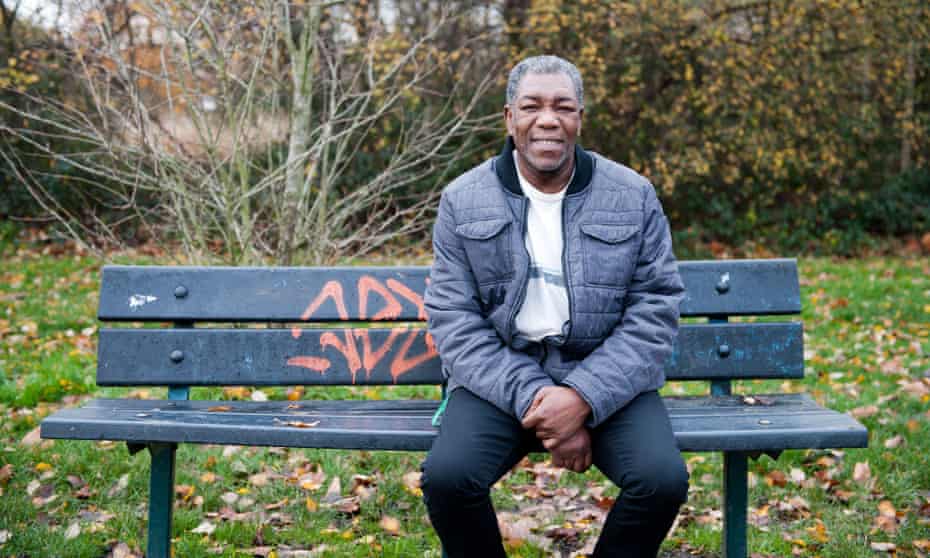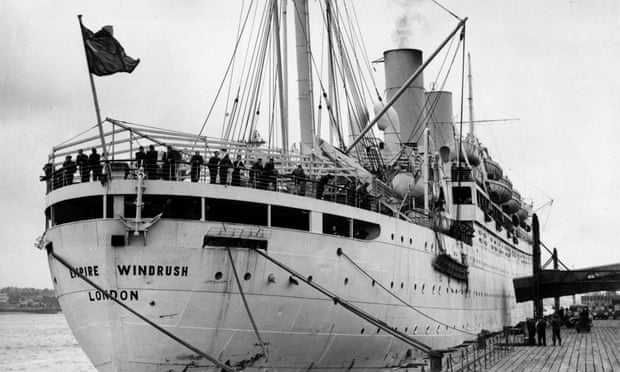David Cameron, you won’t enjoy this: inside the Windrush scandal musical | Theatre
David Cameron’s memoir stretched to 752 pages but he somehow couldn’t find space to describe the ministerial meetings he called in 2013 to brainstorm how best to introduce legislation to transform Britain into a really hostile place for illegal immigrants. The meetings have been described in detail by Lib-Dem coalition colleagues but For the Record, Cameron’s 2019 autobiography, contains no mention of how he collaborated with Theresa May to create this hostile environment. Perhaps he felt it was a part of his legacy it would be preferable to forget.
If that’s the case, the opening song of the new musical On Hostile Ground will come as an unwelcome surprise. The scene is Whitehall, Cabinet Room A, and a youthful version of Cameron declares: “We need to see tough new measures to see net migration reduced by 100,000. / I’m afraid these migrants will need to go home.” Ministerial colleagues were under pressure to devise new ways to increase checks to root out illegal immigrants – in schools, hospitals, banks and workplaces. “I want your proposals, as per my memo,” he chants.
It is hard to think of a more unlikely opening track for a musical, but the first extracts from On Hostile Ground are as brilliant as they are unexpected. Director Charlotte Westenra has worked with writer Juliet Gilkes Romero, lyricist Darren Clark and composer Michael Henry on what might seem an impossible task: making a musical drama out of the complex political events that led first to the creation of the hostile environment and then the catastrophic Windrush scandal.

Difficulties imposed by lockdowns and prohibitions on singing in groups have meant that the piece currently only exists in a series of online videos, which will be released as part of the Royal and Derngate theatre’s Made in Northampton festival showcasing new musical theatre. For the moment, the director has had to abandon visions of a production that would have seen the floor of the Cabinet Office lift up to reveal homeless migrants living in Whitehall underpasses. But the pared-back minimalism of the short videos has its own power.
The first extracts to be released contain a song called Waiting Room, which focuses on Sylvester Marshall, whose difficulties were first highlighted in the Guardian under the pseudonym Albert Thompson. He was refused NHS cancer treatment because he was unable to produce a British passport, despite having lived and worked in Britain for almost half a century. Marshall is taken to a hospital corridor and told he will need to pay £54,000 for the treatment.
Elsewhere, the script finds humour in the bleakly absurd language of British bureaucracy. Actual Conversation uses the transcript from one of Euen Herbert-Small’s many conversations with the Home Office, as he tries to persuade them he is not an illegal immigrant, patiently citing sections of immigration legislation. The 38-year-old IT engineer spent 12 weeks in immigration detention because he failed to convince officials that he had the right to live here.
Q&A
What is the Windrush deportation scandal?

Who are the Windrush generation?
They are people who arrived in the UK after the second world war from Caribbean countries at the invitation of the British government. The first group arrived on the ship MV Empire Windrush in June 1948.
What happened to them?
An estimated 50,000 people faced the risk of deportation if they had never formalised their residency status and did not have the required documentation to prove it.
Why now?
It stems from a policy, set out by Theresa May when she was home secretary, to make the UK ‘a really hostile environment for illegal immigrants’. It requires employers, NHS staff, private landlords and other bodies to demand evidence of people’s citizenship or immigration status.
Why do they not have the correct paperwork and status?
Some children, often travelling on their parents’ passports, were never formally naturalised and many moved to the UK before the countries in which they were born became independent, so they assumed they were British. In some cases, they did not apply for passports. The Home Office did not keep a record of people entering the country and granted leave to remain, which was conferred on anyone living continuously in the country since before 1 January 1973.
What did the government try and do to resolve the problem?
A Home Office team was set up to ensure Commonwealth-born long-term UK residents would no longer find themselves classified as being in the UK illegally. But a month after one minister promised the cases would be resolved within two weeks, many remained destitute. In November 2018 home secretary Sajid Javid revealed that at least 11 Britons who had been wrongly deported had died. In April 2019 the government agreed to pay up to £200m in compensation.
By the end of 2020, victims were describing the long waits and ‘abysmal’ payouts with the scheme, and the most senior black Home Office employee in the team responsible for the Windrush compensation scheme resigned, describing it as systemically racist and unfit for purpose.
Westenra, who has a strong background in political theatre, says musicals can be powerfully persuasive. “Music can really get to the emotion of the story,” she says. “The songs contain complicated stories, but the craft of the lyric is to get a big story into something that feels very, very accessible but which has emotional turmoil going on underneath. It can engage the head and the heart.”
You can’t make this story palatable but music helped us bring light into very difficult subject matter
Writer Gilkes Romero agrees: “You can’t make this story palatable. These are stories that people might want to turn away from, but music has helped us to bring the light – and dark – into very difficult subject matter.” Her play The Whip, performed by the RSC last year, tackled the equally troubling theme of Britain’s decision to take out a vast loan to compensate slave owners once slavery was abolished in 1833 – a loan equivalent to £17bn today that was only paid off in 2015.
Other videos due to be released will focus on the experience of Paulette Wilson, who was mistakenly sent to immigration detention after 49 years in the UK. The Fighter showcases boxer Vernon Vanriel, who grew up in Tottenham, London, but was left destitute in Jamaica when he was unable to return to the UK after a trip there: “Suddenly the government gets you in the gut, / Suddenly you’re living in a broken-down hut.” London Boy features identical twins Darrell and Darren Roberts, who were told they faced deportation to different islands in the Caribbean despite having been born in London and never having left the UK. “The notice of the deportation left me reeling,” they sing. “The only home we’ve ever known is Ealing.”
Although it has not been possible to get the cast to sing together, a painstaking with each actor singing into smartphones at home. Westenra hopes post-Covid there will be an opportunity for a full theatrical production but, in the meantime, these will be seen as finished works in their own right. “It would have been easy,” says Gilkes Romero, “to park a project like this, waiting for the pandemic to be over. But we felt we should make sure this is not forgotten, and give voice to people who have been terribly affected by this government policy.”
Shared From Source link Entertainment


